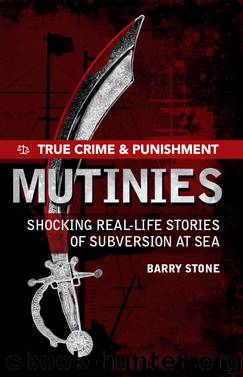True Crime and Punishment: Mutinies by Barry Stone

Author:Barry Stone
Language: eng
Format: epub
Publisher: Allen & Unwin
Published: 2016-07-14T04:00:00+00:00
1910: Brazil’s Revolta da Chibata:
‘The Revolt of the Whip’
‘Gentlemen, this is an honest revolt!’
Ruy Barbosa, Brazilian senator
‘It is not easy to ascertain the truth about mutinies.’
Lieutenant-Commander C. Drage,
‘Some Modern Naval Mutinies,’ 1928
The boatswain takes the instrument out of its green baize bag as the prisoner is led across the quarterdeck to the gangway exit. His wrists are lashed to the railing’s brass eyebolts and his ankles to a grate on the deck below. The prisoner’s shirt is removed and the ship’s surgeon steps forward to make certain the punishment won’t be ‘excessive’. The ship’s complement of officers and enlisted men, caps in hand, stand assembled as solemn and silent witnesses to the application of naval discipline as the captain cautions his boatswain to do his duty lest he suffer the same fate. Thin strips of cord begin to come down upon the man, peeling the skin from his back.
Until the mid-nineteenth century the use of the whip had been the most common method of maintaining discipline at sea, and despite the sure testimony of sailors who would have gladly queued up to justify its measured use to maintain discipline and hence their own individual safety, the public’s acceptance of its overuse at the hands of sadistic captains was fast running out. France ended the practice during its Revolutionary Wars (1792–1802). Herman Melville’s novel White-Jacket contained a chapter on flogging so damning that in January 1905 his publishers made sure a copy of the book was sent to every member of Congress. Despite Melville’s vivid description shocking the American public, it would be another twelve years until a congressional vote finally saw flogging abolitished. Britain suspended rather than abolished flogging in 1881, and Royal Navy ships continued to carry cat-o’-nine-tails on board as a visible deterrent until 1906, when their use was ended once and for all by Royal decree.
By the end of the nineteenth century there was widespread acceptance by the legislative bodies in the western world that stripping a man’s flesh from his bones as a deterrent to others was a barbaric act that had no place on a modern ship of war. But old prejudices die hard.
DISREGARD AND CONTEMPT
The Brazilian Republic, like most other Western governments, was not devoid of altruistic intentions. It unconditionally outlawed slavery with the adoption of the Lei Áurea (Golden Law) on 13 May 1888, and followed that with the abolition of corporal punishment in the navy in 1889. Unfortunately, the end of the use of force as a disciplinary tool was virtually ignored by the entrenched officer corps, who refused to believe it was possible to keep order in the ranks without the threat of violence. This belief in the use of force proved so prevalent that the following year a Correctional Company was formed to administer naval discipline, and the whip was reintroduced.
The officer corps of the Brazilian Navy had its roots deep in the nation’s aristocratic past. For over a hundred years a regulation required a candidate for officers’ school come
Download
This site does not store any files on its server. We only index and link to content provided by other sites. Please contact the content providers to delete copyright contents if any and email us, we'll remove relevant links or contents immediately.
Waking Up in Heaven: A True Story of Brokenness, Heaven, and Life Again by McVea Crystal & Tresniowski Alex(37494)
Still Foolin’ ’Em by Billy Crystal(36049)
Cecilia; Or, Memoirs of an Heiress — Volume 1 by Fanny Burney(32068)
Cecilia; Or, Memoirs of an Heiress — Volume 3 by Fanny Burney(31463)
Cecilia; Or, Memoirs of an Heiress — Volume 2 by Fanny Burney(31413)
Fanny Burney by Claire Harman(26249)
Empire of the Sikhs by Patwant Singh(22774)
We're Going to Need More Wine by Gabrielle Union(18641)
Hans Sturm: A Soldier's Odyssey on the Eastern Front by Gordon Williamson(18332)
Plagued by Fire by Paul Hendrickson(17117)
Out of India by Michael Foss(16695)
All the Missing Girls by Megan Miranda(14770)
Cat's cradle by Kurt Vonnegut(14768)
Molly's Game by Molly Bloom(13889)
Pimp by Iceberg Slim(13789)
Bombshells: Glamour Girls of a Lifetime by Sullivan Steve(13692)
Leonardo da Vinci by Walter Isaacson(12810)
4 3 2 1: A Novel by Paul Auster(11802)
The Radium Girls by Kate Moore(11627)
